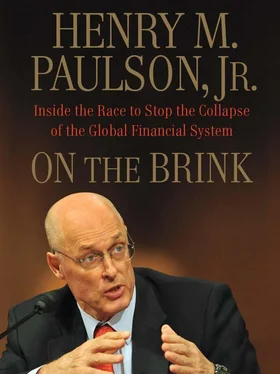“The group you’re shooting for is the one-third in the middle,” Boehner told me. “And you’re fishing in a small pond.”
Boehner’s staff had set up a table with food in the back of the office, and people came and went as we grappled with how to deal with the crisis. I did more listening than speaking, trying to understand what Boehner was dealing with, and it dawned on me how difficult it was to reason with some people. The facts didn’t seem to matter to some in this group. I looked around and wondered where the votes would come from. Florida’s Adam Putnam was the most constructive—he suggested that I needed to tell people more explicitly how bad it would be if the financial system collapsed: massive unemployment, people living on the streets. Adam was right, but scaring the public to win support would only make things worse economically.
Virginian Eric Cantor, meanwhile, was pushing an insurance program. It wasn’t particularly well developed, but it was meant to avoid big government intervention. The plan, as I understood it, would have provided insurance to companies holding the frozen mortgage assets, allowing them to limit their losses. The firms would have had to pay insurance premiums to the Treasury Department for the coverage. By that evening I was at the end of my rope, and I lost it a little, making a sarcastic remark to Cantor about dropping our whole plan in favor of his insurance idea.
“We’ve gone to the American people, we’ve gone to Congress, we’ve put forward the best idea to deal with this problem, and we’ve got a good number of people that are supportive,” I remember saying. “And you want me now to go and say, ‘Hey, I’ve thought about it some more. I got a better idea. I’m going to go with Eric Cantor’s insurance program. That’s the idea to save the day.’”
I left Boehner’s office demoralized. A number of people pulled me aside, saying, in effect, “We believe this is a serious situation, but you’re not going to get the votes for this. You’re going to have to come up with another idea that works.”
Wednesday, September 24, 2008
After the gathering at Boehner’s office, I was not looking forward to meeting with the entire House Republican Conference the next morning. It was scheduled for 9:00 a.m. in the Cannon Caucus Room. By then, too, I’d heard all about the fiasco of the morning before, when Vice President Cheney, Josh Bolten, Keith Hennessey, and Kevin Warsh had traveled to the same room to argue for TARP only to endure a long, ugly meeting with angry Republicans.
Before I left for the GOP conference, Michele Davis and Kevin Fromer told me to present the lawmakers with something they could understand. I would have to make them see that the esoteric numbers on the screens of Treasury’s Markets Room translated into real danger for the average American. Credit markets were still in crisis. The squeeze in the Treasury market had become almost unimaginable. Fails to deliver had now reached a staggering total of $1.7 trillion—compared with $20 billion 12 days before.
Knowing how difficult this meeting was going to be, I asked Ben Bernanke to accompany me, and he readily agreed to do so. Speaking to the crowd in the grand meeting room with its deep red carpet and crystal chandeliers, we explained that the commercial paper market was nonexistent, and that financing was disappearing for big and small companies alike, endangering their ability to sustain normal activities. But it didn’t make a bit of difference to this group, which opposed big government intervention as a first step on the path to socialism. They lined up ten deep on both sides of the room, waiting for a microphone, and blasted us. Certain that their constituents opposed bailouts, they could not be persuaded to support TARP.
Although Boehner had been firm and direct about his support in our September 18 meeting with congressional leaders, he was less friendly and eager to work with us in this setting. He limited his comments to a short pep talk on the previous day’s tactical victory on offshore oil drilling. Then one member after another said the bill couldn’t pass without House Republicans, and there was nothing we could do to change their minds. It was an untenable situation. Afterward one member of Congress came up to me and said, “I’ve been talking about deregulation and free markets my whole life. You’re asking me to change my view, and there is no way I can do that.” That response applied to many in the group that morning.
Shortly afterward, Boehner and I went to Pelosi’s office and told her about the meeting. She wanted to get TARP passed, and she pressed Boehner: “What can you do? What ideas do you have?” He didn’t have much beyond Cantor’s insurance plan, which he acknowledged was not really well formulated. He mentioned the possibility of “pro-growth” ideas, but Pelosi said it was no time to be talking about “tax cuts for the wealthy.”
The House Financial Services Committee convened at 2:30 p.m. Some House hearings could be terrible—you never knew what was going to happen. But Barney Frank’s hearings were different. Always pragmatic and efficient, he made sure things moved along with a fair amount of decorum.
Nonetheless, Ben and I were besieged with questions from all sides. Why wouldn’t the government take stakes in the companies it helped? Why wouldn’t we put restrictions on executive pay? In fairness, this is how our representative government works. Some members were grandstanding, positioning themselves to help their reelection campaigns. But for the most part, the lawmakers were just doing their jobs, trying to understand in a very short amount of time a complex issue for which most had little preparation or background. And we were asking for a lot.
In the Senate hearing the day before, I had stood firm on the compensation issue, but I now realized that I would have to give some ground. I told the House panel that we would find a way to address executive pay.
Paul Kanjorski, the Pennsylvania Democrat who chaired the Capital Markets Subcommittee, said we still hadn’t made a convincing case. “The average American people don’t really know what you are really talking about when you say it is going to cost us far less than the alternative,” he said, noting that I needed to clearly explain the ramifications of an electronic run on the money market system. “When I talk to average Americans in my district and across this country, the sun came up today, they went to work today, they stopped and picked up gas today,” he went on, “and they are wondering what all the hullabaloo is about.” What, he pointedly asked me, was the alternative I referred to?
I answered this question as best as I could, given that Barney kept hustling the hearing along. But there was no doubt about it—the session wasn’t going well. Topping it off, Michele Davis got a message on her BlackBerry that John McCain was suspending his campaign to return to Washington to tackle the economic crisis. She passed me a note that said in part, “If you get a question, just say that you know that both Senators McCain and Obama recognize the seriousness of the situation.”
I turned around and looked at Michele, stunned. This was crazy. Even more incredibly, I had spoken to Lindsey Graham just minutes before walking into the hearing, and he hadn’t said a word about McCain’s coming back.
When the hearing recessed, I went into Barney’s office and called Josh Bolten to tell him in no uncertain terms that I thought it was dangerous for McCain to return. I was dumbfounded that the president had allowed it. Josh said the White House was equally frustrated. McCain wanted a meeting at the White House, and the president felt he had no choice but to accommodate him.
Читать дальше












